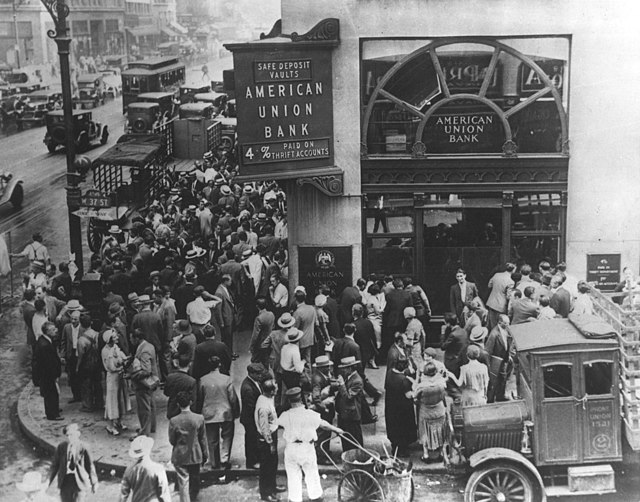A bank run or run on the bank occurs when many clients withdraw their money from a bank, because they believe the bank may fail in the near future. In other words, it is when, in a fractional-reserve banking system, numerous customers withdraw cash from deposit accounts with a financial institution at the same time because they believe that the financial institution is, or might become, insolvent. When they transfer funds to another institution, it may be characterized as a capital flight. As a bank run progresses, it may become a self-fulfilling prophecy: as more people withdraw cash, the likelihood of default increases, triggering further withdrawals. This can destabilize the bank to the point where it runs out of cash and thus faces sudden bankruptcy. To combat a bank run, a bank may acquire more cash from other banks or from the central bank, or limit the amount of cash customers may withdraw, either by imposing a hard limit or by scheduling quick deliveries of cash, encouraging high-return term deposits to reduce on-demand withdrawals or suspending withdrawals altogether.

American Union Bank, New York City, April 26, 1932
10 livres tournois banknote issued by Banque Royale, France, 1720. In 1720, shareholders demanded cash payment, leading to a run on the bank and financial chaos in France. On display at the British Museum.
The run on the Montreal City and District Savings Bank, with the mayor addressing the crowd. Printed in 1872 in the Canadian Illustrated News.
A poster for the 1896 Broadway melodrama The War of Wealth depicts a 19th-century bank run in the U.S.
A bank is a financial institution that accepts deposits from the public and creates a demand deposit while simultaneously making loans. Lending activities can be directly performed by the bank or indirectly through capital markets.
This 15th-century painting depicts money-dealers at a banca (bench) during the Cleansing of the Temple.
Sealing of the Bank of England Charter (1694), by Lady Jane Lindsay, 1905.
Interior of the Helsinki Branch of the Vyborg-Bank [fi] in the 1910s
Banco de Venezuela in Coro.







![Interior of the Helsinki Branch of the Vyborg-Bank [fi] in the 1910s](https://upload.wikimedia.org/wikipedia/commons/thumb/6/64/Pohjoismaiden_Osakepankin_Helsingin_sivukonttori.jpg/640px-Pohjoismaiden_Osakepankin_Helsingin_sivukonttori.jpg)
